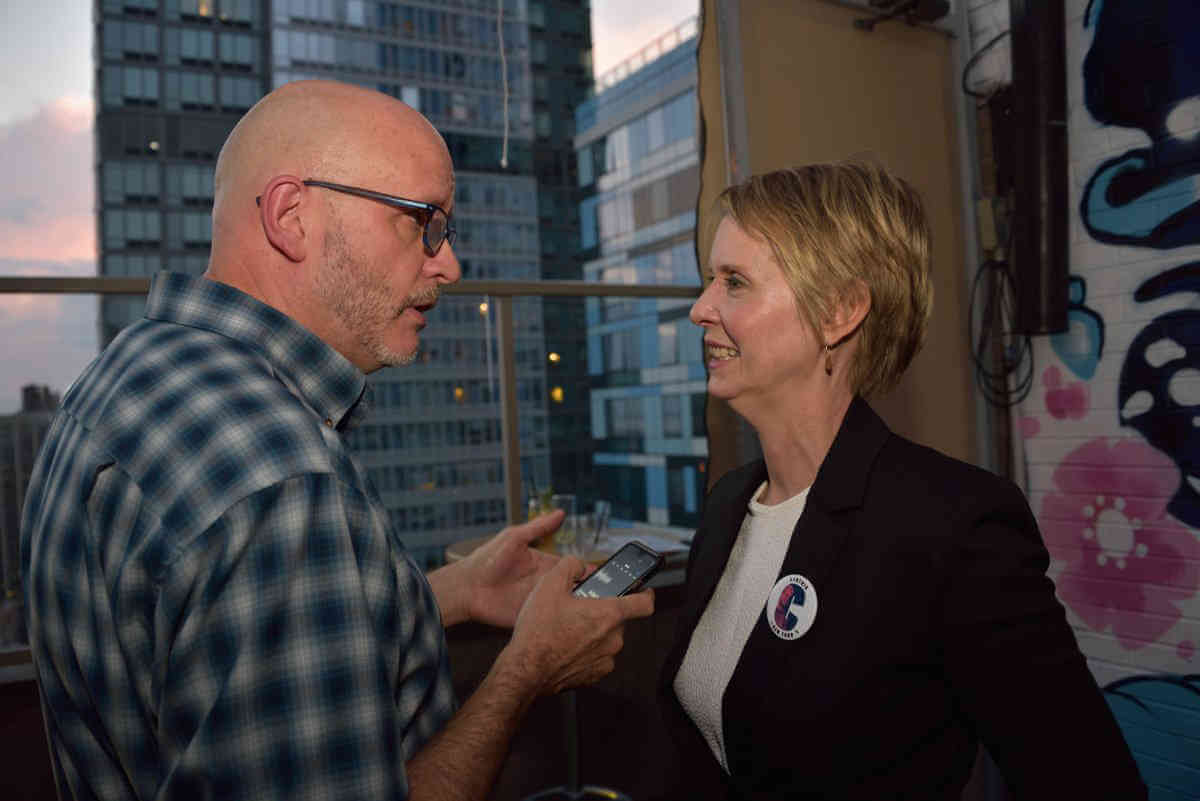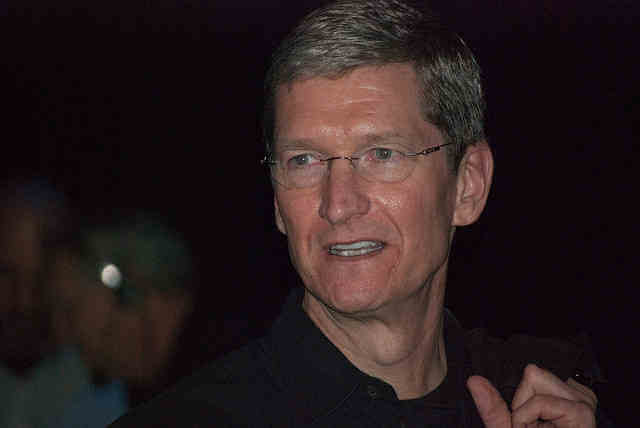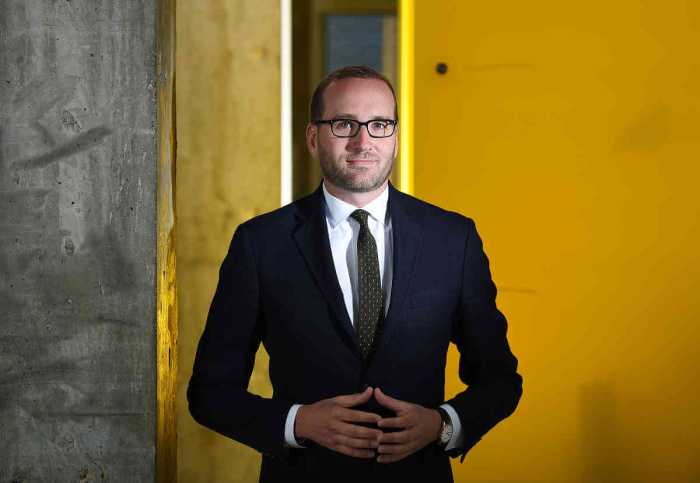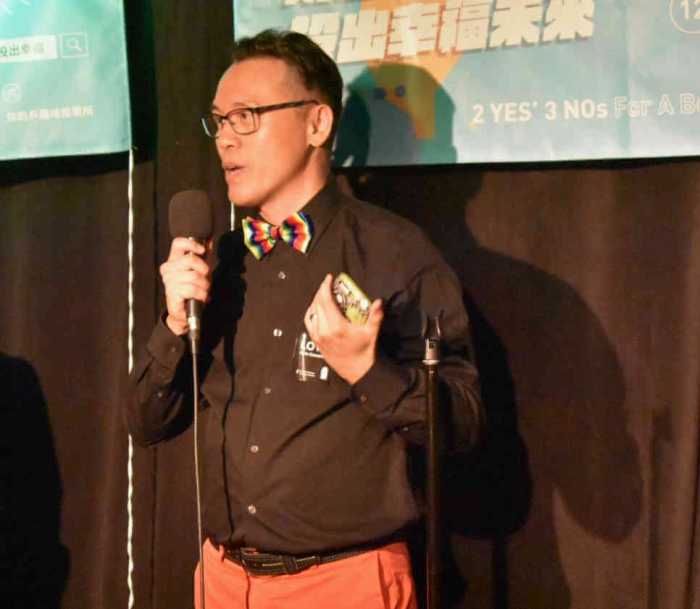Following an August 22 appearance before a small crowd of mostly young LGBTQ people of color at a downtown Brooklyn hotel, Cynthia Nixon took a moment to answer the most critical question Gay City News had about her uphill quest to become governor of New York.
How in the less than five months between election day in November and the April 1 deadline for the state to deliver its annual budget does she propose to turn around a huge ship amounting to roughly $170 billion to reflect the progressive values she has crisscrossed the state to espouse?
“You know, if I am elected governor of New York State it will usher in such a new day,” she said. “And I’m not the only person up for election this year. We will have Andrea Stewart-Cousins as the leader of the State Senate Democrats, and we have had so many priorities teed up for so long that the Republicans will not introduce into the State Senate.”
Asked, in a follow-up, if she was saying that Albany’s Democratic establishment would readily embrace her as their leader — both Stewart-Cousins and Assembly Speaker Carl Heastie are supporting her opponent, incumbent Andrew Cuomo — she responded, “Absolutely, because what you have now is a governor who calls himself a Democrat and calls himself a progressive but is really looking for cover from Republicans for all of this legislation he doesn’t want to enact, either, because it’s too progressive. He thinks it puts him in a bad position when he runs for president. Or, more often, he just does nothing.”
Nixon’s answer was not without its merits. Throughout her campaign, she has emphasized progressive goals that have widespread popularity in the age of Trump but have not advanced under Cuomo in two terms — comprehensive campaign finance reform, more equitable funding for public schools statewide, improvements in the city’s ailing subway system coupled with enactment of a comprehensive congestion pricing scheme to curb the city’s traffic gridlock, single payer health care, codifying the reproductive freedom now guaranteed by an imperiled Roe v. Wade, and marijuana legalization.
And in highlighting those shortfalls in Cuomo’s record, Nixon repeatedly cites something that angers many progressive New York Democrats — the governor’s implicit support for the eight Democrats who, until recent months, had caucused as the Independent Democratic Conference (IDC) and, along with one other dissident Democrat, made it possible for the minority Republicans to maintain control of the State Senate. Those Republicans, in turn, have blocked the issues Nixon highlights in her campaign, many of which Cuomo has also given considerable lip service.
Despite the strength of her political positioning, Nixon is clearly struggling. In her last campaign finance filing, she showed less than half a million dollars on hand versus nearly $25 million for the incumbent. The challenger touts her clean hands for not accepting corporate donations, but she has notably fallen short in motivating the type of small-dollar grassroots donations that have fueled other political insurgents.
Public polling also offers scant encouragement. In more than half a dozen surveys by three different polling outfits, Nixon has never done better than a 22-point deficit compared to Cuomo, and the three most recent polls put the gap at more than 30 points.
In her remarks on August 22, Nixon seemingly acknowledged that yawning gap by arguing that New York State, since the election of Donald Trump, has seen a surge of new Democratic registrations totaling more than 580,000, “most of them progressives,” she said.
“We have a real path to victory,” she insisted.
But the new registrations Nixon cited amount to more than the total turnout in the 2014 gubernatorial primary, when Zephyr Teachout, who had less name recognition than Nixon enjoys, surprised pundits by capturing 34 percent of the vote.
Nixon’s troubles are, in some respects, at odds with news elsewhere. In recent gubernatorial primaries in Georgia and Florida, Democrats chose the progressive alternatives, both African-American, in Stacey Abrams and Andrew Gillum, respectively. Closer to home, of course, political newcomer Alexandria Ocasio-Cortez toppled Congressmember Joe Crowley, the Queens Democratic leader.
A key hurdle Nixon faces is the suspicion that many Americans — and progressives, especially — have toward “celebrity” candidates in the wake of Donald Trump’s emergence.
Earlier this year, two seasoned political observers, in comments to Gay City News, articulated this handicap in blunt terms. George Arzt, who owns a communications and lobbying firm long active in city politics, noted that Cuomo could say, “You have a novice in Washington, and look at what a mess he’s made of the nation, if not the world, in terms of destabilizing it. You need an experienced hand to defend our values.”
Mitchell Moss, an urban policy and planning professor at NYU, was even more scathing in his assessment, saying, “I believe that government requires some level of knowledge and experience that is not found on the Broadway stage or the TV screen or the wrestling ring. The problem we have is that we don’t know enough about Cynthia Nixon and what we know about her is not relevant.”
It’s safe to bet that neither Arzt nor Moss style themselves as part of the resistance, but a daunting challenge facing Nixon is that many people who do identify as Trump’s opposition have repeated much the same view in conversation or social media posts.
Unsurprisingly, Nixon has found little support among institutionalized advocacy groups that rely on long-term relationships to advance their issues. Organized labor is solidly with the governor, and, in fact, the primary effect of the Working Families Party’s endorsement of Nixon seems to be the party’s loss of its key labor alliances.
More distressing for the challenger, no doubt, is her inability to win a stamp of approval from leading women’s and LGBTQ rights organizations. Cuomo boasts endorsements from the Human Rights Campaign and the New York chapters of both Planned Parenthood and the National Organization for Women.
And it’s not just the established players that have eschewed her candidacy. Leading grassroots marriage equality activists took Nixon to task in no uncertain terms when she implied that Cuomo’s key role in winning equal marriage rights here in 2011 was his way of helping New York Republicans get an issue that was increasingly hurting them off the table.
In a sign-on letter in which longtime activist Cathy Marino-Thomas, a former board president of Marriage Equality USA, took a lead role in crafting, the group stated, “Ms. Nixon’s account of the political landscape at best shows naivety and ignorance or at worst is a cynical omission of the truth. Her take is not just inaccurate, it’s undermining of important work by true activists and supportive elected officials. It is also self-serving and amounts to a gesture intended to serve her current purposes that rewrites history and erases work that transformed hundreds of thousands of lives for the better.”
If the rebuke from grassroots marriage activists stung, Nixon arguably got the better of a more famous intra-LGBTQ fracas. In March, when Nixon, a staunch supporter of Mayor Bill de Blasio’s two mayoral campaigns, announced her run, former Speaker Christine Quinn, who did not enjoy Nixon’s support in 2013, told the New York Post, “Cynthia Nixon was opposed to having a qualified lesbian become mayor of New York City. Now she wants an unqualified lesbian to be the governor of New York.”
This was not Quinn at her best, and Nixon wasted no time making hay of the gaffe, saying via Twitter, “When I announced yesterday that I’m running for gov, one of Cuomo’s top surrogates dismissed me as an ‘unqualified lesbian.’ It’s true that I never received my certificate from the Department of Lesbian Affairs, though in my defense there’s a lot of paperwork required.”
“Unqualified Lesbian” T-shirts soon surfaced.
Nixon, who married her wife Christine Marinoni — a public policy expert who shares her deep commitment to issues of educational equity — in 2012 and has three children, including a 21-year-old transgender son, does have her LGBTQ supporters. The Jim Owles Liberal Democratic Club endorsed her, and Brooklyn’s Lambda Independent Democrats were sufficiently divided between the two candidates that they made no gubernatorial endorsement.
Among gay elected officials, Brooklyn City Councilmember Carlos Menchaca endorsed Nixon very early, and has since been followed by Queens Councilmember Jimmy Van Bramer and Manhattan Assemblymember Daniel O’Donnell. It was O’Donnell, as sponsor of the Marriage Equality Act, who put the first points on the board when the Assembly passed the measure in 2007.
Ken Sherrill, an out gay professor emeritus of political science at Hunter College, commenting earlier this year, was impressed by Nixon’s campaign launch, saying he was struck by “how much more polished she was as a candidate than Zephyr Teachout.”
In Sherrill’s view, Cuomo has few substantive achievements to tout from his second term, in part because he had co-signed Republican-IDC control of the State Senate in order to maximize his own power by having a divided Legislature. That power, however, is largely the power to block things — more state spending, higher taxes, and wealth redistribution — according to Sherrill. Nixon has focused considerable attention on issues that require spending. Cuomo’s tightfistedness, he suggested, is where Nixon’s message “can resonate.” Pointing to Cuomo’s leadership on marriage equality in 2011, Sherrill noted that most of his “progressive” achievements have been on issues that didn’t involve spending money.
Cuomo, however, has won endorsement from the Stonewall Democratic Club of New York City, the Gay and Lesbian Independent Democrats, and the Lesbian and Gay Democratic Club of Queens, along with Council Speaker Corey Johnson from Chelsea and Councilmembers Daniel Dromm of Queens and Ritchie Torres from the Bronx.
Meanwhile, LGBTQ endorsers of Nixon have been joined by other leading progressives across the city, including Ocasio-Cortez, Councilmembers Antonio Reynoso and Brad Lander of Brooklyn, former Council Speaker Melissa Mark-Viverito, several candidates, like Jessica Ramos and Robert Jackson, waging primary campaigns against IDC-affiliated state senators, resistance groups such as several chapters of Indivisible, and political clubs including the Broadway Democrats, the Central Brooklyn Independent Democrats, the Coalition for a District Alternative, the Downtown Independent Democrats, and the Village Independent Democrats.
The Nation magazine, which was a big booster of de Blasio’s candidacy in 2013, has also endorsed Nixon.
It will take something like a political earthquake for Nixon to prevail over Cuomo on September 13. But even in defeat, she could take pride in raising the visibility and viability of key issues including marijuana legalization, universal health care, and the governor’s accountability for saving our subways.
And it is certainly refreshing to hear a candidate speak in such unvarnished personal terms about having a child come out as transgender and being warned by a mother who had to resort to an illegal abortion about the dangers of ever going back to that time.



































